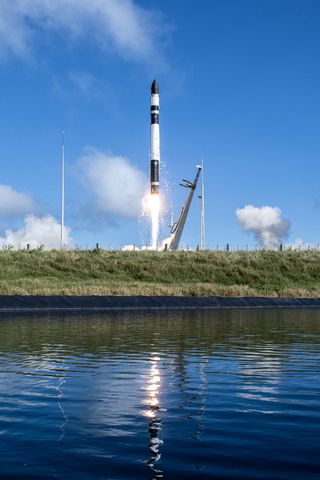Rocket Lab Successfully Launches First Batch of TROPICS Satellites for NASA
The ‘Rocket Like a Hurricane’ launch was the first of two dedicated Electron launches to deploy a constellation of hurricane monitoring satellites for NASA
MAHIA,

Electron lifts off from Rocket Lab Launch Complex 1 for the 'Rocket Like a Hurricane' launch to deploy satellites for NASA's TROPICS constellation. (Photo: Business Wire)
The ‘Rocket Like a Hurricane’ launch lifted-off on May 8 at 13:00 NZST (01:00 UTC) from Rocket Lab Launch Complex 1 on New Zealand’s Mahia Peninsula deploying two of the four CubeSats that comprise the TROPICS constellation (Time-Resolved Observations of Precipitation structure and storm Intensity with a Constellation of Smallsats). TROPICS will monitor the formation and evolution of tropical cyclones, including hurricanes, and will provide rapidly updating observations of storm intensity.
The constellation, which is part of NASA’s Earth System Science Pathfinder Program, requires launch to 550 kilometers altitude and inclination of about 30 degrees. Each pair of CubeSats must be launched to two specific orbital planes that are equally spaced 180 degrees opposite to maximize the temporal resolution. These unique orbits over Earth’s tropics allow the satellites to travel over any given storm about once an hour compared with current weather tracking satellites that have a timing of about once every six hours. This high revisit rate aims to help scientists better understand the processes that effect these high-impact storms, ultimately leading to improved modeling and prediction to help protect lives and livelihoods. All four TROPICS satellites need to be deployed into their operational orbit within a 60-day period, a mission requirement made possible with small dedicated launch. With the first batch of TROPICS CubeSats now in orbit, the second launch, called ‘Coming to a Storm Near You,’ is expected to launch on another Electron rocket in approximately two weeks from Launch Complex 1.
“The TROPICS constellation has the real potential to save lives by providing more timely data about storm intensity and providing advance warning to those in storm paths, so it’s an immense privilege to have deployed these spacecraft to their precise orbits before the upcoming storm season,” said Rocket Lab founder and CEO Peter Beck. “We’re grateful to the NASA team for entrusting us with such a critical mission and we look forward to completing the constellation with the second Electron launch in the coming days.”
“We are extremely proud of all our partners, including MIT Lincoln Labs, Blue Canyon Technologies, KSAT, and Rocket Lab for successfully executing on this first launch. We look forward to the entire constellation being on-orbit to realize the benefits for the agency, as well as for our colleagues around the world,” said Ben Kim, TROPICS program executive for NASA’s Earth Science Division.
‘Rocket Like a Hurricane’ was Rocket Lab’s fourth mission for 2023 and the Company’s 36th Electron mission overall. It brings the total number of satellites launched to orbit by Rocket Lab to 161.
Follow Rocket Lab on Twitter @RocketLab for real-time updates about the next TROPICS launch.
ABOUT Rocket Lab
Founded in 2006, Rocket Lab is an end-to-end space company with an established track record of mission success. We deliver reliable launch services, satellite manufacture, spacecraft components, and on-orbit management solutions that make it faster, easier and more affordable to access space. Headquartered in
Forward-Looking Statements
This press release may contain certain “forward-looking statements” within the meaning of the Private Securities Litigation Reform Act of 1995, Section 27A of the Securities Act of 1933, as amended, and Section 21E of the Securities Exchange Act of 1934, as amended. All statements, other than statements of historical facts, contained in this release, including statements regarding our expectations of financial results for first quarter 2023, strategy, future operations, future financial position, projected costs, prospects, plans and objectives of management, are forward-looking statements. Words such as, but not limited to, “anticipate,” “aim,” “believe,” “contemplate,” “continue,” “could,” “design,” “estimate,” “expect,” “intend,” “may,” “might,” “plan,” “possible,” “potential,” “predict,” “project,” “seek,” “should,” “suggest,” “strategy,” “target,” “will,” “would,” and similar expressions or phrases, or the negative of those expressions or phrases, are intended to identify forward-looking statements, although not all forward-looking statements contain these identifying words. These forward-looking statements are based on Rocket Lab’s current expectations and beliefs concerning future developments and their potential effects. These forward-looking statements involve a number of risks, uncertainties (many of which are beyond Rocket Lab’s control), or other assumptions that may cause actual results or performance to be materially different from those expressed or implied by these forward-looking statements. Many factors could cause actual future events to differ materially from the forward-looking statements in this release, including risks related to the global COVID-19 pandemic; risks related to government restrictions and lock-downs in
View source version on businesswire.com: https://www.businesswire.com/news/home/20230507005055/en/
Rocket Lab Media Contact
Morgan Bailey
media@rocketlabusa.com
Source: Rocket Lab USA, Inc.







